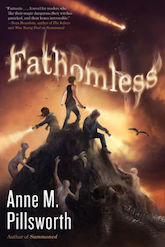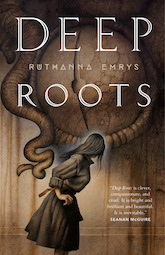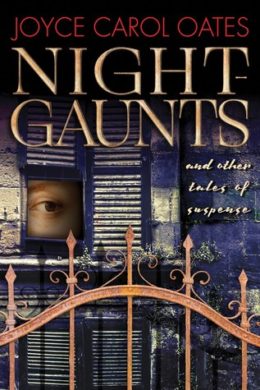Welcome back to the Lovecraft reread, in which two modern Mythos writers get girl cooties all over old Howard’s sandbox, from those who inspired him to those who were inspired in turn.
Today we’re looking at Joyce Carol Oates’s “Night-Gaunts,” first published in the October 2017 issue of Yale Review. Spoilers ahead.
“On his father’s right cheek, a small coin-sized birthmark of the hue of dried blood, with a suggestion of miniature fingers, or tendrils. An opened hand? But very small.”
Summary
Horace Phineas Love, Jr., sees a face in the window of the (vacant) Cornish House atop Charity Hill in Providence, where (once) he lived. It’s gaunt, pale and impassive, eyes sunken yet alive and alert. Gleeful. But there can be no face in the empty house. Perhaps it’s the reflection of the quarter-moon, “paper-thin and elusive behind a bank of gauzy stratus clouds.” Then Horace hears: Son? Come to me.
Time jumbles. He’s eleven years old, or seventeen, or an adult. His father has been dead for many years, or his father has died today, or his father is still a living figure of dread. Horace Phineas Love, Sr., was “riff-raff” until he married the daughter of Providence banker Obadiah Cornish. Handsome and hale, he treats his puny offspring at best with affable mockery, at worst with contempt. His wife fares little better, for Love spends his “work” days playing poker with male companions and amusing himself with female acquaintances about whom Gladys Cornish Love knows little, but too much. The whiskey bottle is never far from his hand. Alcohol–a poison as even young Horace knows–soon takes its toll. As Horace’s father loses looks and health, he adds physical and even sexual abuse to Horace’s woes. In the end, Love’s drunken rages and instability are too much for the household, and he’s placed in the Butler-Hope Psychiatric Hospital.
For Horace, Love’s death is a “miraculous” relief, “a sobbing sort of happiness” that must be hidden lest all know him as a cold-hearted freak. He tries to play the grieving son at Love’s funeral but forced to peer into the coffin, he’s appalled to see how Love’s last illness has pocked his face and lips with sores and swollen the birthmark on his cheek into an inflamed boil. As his nanny lifts Horace to give his father a last kiss, he sees the corpse’s eyelid’s flicker, the lips exude greenish froth. He struggles and screams until he faints.
But once Love is buried, Horace is free, isn’t he?
Until the night-gaunts start to appear.
They resemble “an animated dust mote, or a living molecule, that quivered, and shimmered, and if it did not fade at once…seemed to enlarge, into three dimensions, as a protoplasmic life-form might enlarge.” They haunt shadowed corners of Horace’s room, or the space behind his mirrored reflection. A transparent figure with jellyfish tendrils and an odor like damp-rot shimmers down the attic stairs. Other night-gaunts drift across the ceiling and descend in a fine green toxic froth like that on his father’s dead lips, or hide rat-sized and playing-card thin under his pillow, to gnaw his throat once he falls asleep. A wasp-like buzz makes him lean out of bed to see a living ball of—what, serpents?—“writhing together in obscene struggle.”
Horace tells no one. He knows only he, a freak, can see them. It’s his curse, but may one day be his blessing.
Meanwhile, he explores his grandfather’s legacy: a library full of rare books, medieval manuscripts, collections of “horrific but luridly beautiful drawings by…masters of the transcendental macabre.” Oh, and there’s a Necronomicon, too. The library and third floor attic become refuges for Horace as his widowed mother sinks deeper into grief, or some other illness, drawing them both into social isolation. At twelve, rummaging in Obadiah’s desk, Horace finds a talisman: an Endura fountain pen in ebony black, trimmed in gold titanium. It becomes his secret instrument, first copying from Ovid and Homer and Dante, then creating his own weird tales. At the Providence Athenaeum he devours Poe, Bierce, Stoker, James; he dreams his ancestors into Titans, the Titans into gods still more ancient, into beings from before Time itself began.
Horace’s mother declines. In fits of anger she lashes out at servants, even Horace. When she dies, there’s little left of her estate, barely enough to keep her son in genteel poverty. He makes some money writing, but not much; he writes them principally “to contain the unspeakable wonders of weird love.” Besides, the talismanic pen keeps him safe from the night-gaunts.
Nevertheless a nagging question remains: What killed his father? In the guise of a lawyer for his mother’s estate, Horace goes to Butler Hope Hospital. A nurse tells him the “poor man” died of syphilis. His wife was likely infected as well, and children too would have been at risk.
***
Horace’s clothes fit poorly, because they are his father’s; his mother didn’t see any need to waste an expensive wardrobe. He wears them long after both parents’ deaths, as he sits in the Athenaeum, words pouring from his ebony pen. Mrs. D__, a kind librarian, has asked him for one of the magazines in which his stories are published, but he hasn’t yet given her a copy of Weird Tales—not a periodical to which the Athenaeum subscribes. It doesn’t matter. One day the name Horace Phineas Love, Jr., will be as revered in Providence as the name Cornish!
In the library restroom, his spirits plunge, for a pale night-gaunt stares brazenly out of the mirror. I’m not one of you, Horace wants to protest. I haven’t despaired. I’m still alive. What I’ve written will endure. In line to borrow books, he wonders why other patrons keep barging ahead of him, why Mrs. D__ ignores him.
Then he sees her shudder, hears her tell another librarian she’s suddenly cold, and he realizes that he is the cold.
It’s only polite for him to leave, which he does “both frightened and exhilarated, like one who has stepped across a threshold in full knowledge that a door will slam shut behind him and lock against him irrevocably.” The wind blows him up the steep cobbled street to the Cornish House, whose iron gate is locked and rusted (though didn’t he just leave it that day? How can he be locked out of his own house?)
He shakes the bars. Then he sees it, in the octagonal window under the eaves, pale and blurred beyond the glass: a face?
What’s Cyclopean: Beautiful turns of phrase abound. “It had happened so long ago, the child’s tears had long dried and turned to salt.”
The Degenerate Dutch: Horace is surrounded by bigoted whispers, and soaks them up. Promiscuously mingling races spread disease; “dark-skinned beings”—them—are not to be trusted, and will probably steal your wallet while trying to seduce you.
Mythos Making: Horace’s life mimics Lovecraft’s in some ways, and his stories seem to do so as well—common quotes, common settings like the Antarctic and the Cretaceous, common publication in Weird Tales.
Libronomicon: Horace’s grandfather’s library contains a copy of the not-so-rare Necronomicon, along with Ovid and Dante and Homer. The Athenaeum provides a different sort of forbidden literature: Poe, Bierce, Stoker, and James.
Madness Takes Its Toll: Horace’s parents (like Howard’s) die in Butler hospital. Thus inspired, he pens tales in which “the logic of daylight was overcome by painstaking degrees by the barbaric madness of night.”
Anne’s Commentary
Buy the Book


Fathomless (Redemption’s Heir)
This is going to be a tough one for me, because I’m about equally divided between “Wow!” and “Whoa!” And no, I’m not pissed off by the fact that Oates’s night-gaunts aren’t into tickling. I wasn’t expecting “Fifty Shades of Rubbery Black” or anything. And I hope that sound I just heard was neither the loose reverberation of leathery wings nor the knocking knees of suddenly titillated readers.
It’s just—
As an actual toiler in the fields of mental health, and specifically the fields of Butler Hospital, how can I not be taken aback by the representation (albeit fictional) of one of our nurses betraying patient confidentiality? Possibly I’m misapplying modern privacy standards to those of the early 20th century. However, my resident RN and stickler for authenticity in fictive medical practice insists that no nurse since Florence Nightingale could in good conscience discuss a patient’s medical history as Lawyer “Ryerson’s” informant does. She also opines that said informant is a variation on that venerable mystery trope, the chatty old servant who helps the detective to a slice of family history at the crucial moment. And, she concludes indignantly, isn’t it time we stopped viewing nurses as SERVANTS?
Poke an authenticity bear and be ready with your earplugs, because they only have two volumes, OFF and MAX OUTRAGE.
Actually, what “whoaed” me more about “Night-Gaunts” was figuring out Oates’s conceit in creating a protagonist whom the reader is clearly meant to identify with Lovecraft, whose life mirrors Lovecraft’s in many ways, and yet who is (at least for me) so NOT Lovecraft. Or maybe if I put it that Horace Phineas Love, Jr.’s life SHADOWS Howard Phillips Lovecraft’s life….
That makes more sense to my sensibility, because poor Horace is such a dark version of Howard, Howard to the Gothic max and Dickensian ultrapathetic. Horace is a Howard for whom everything has gone wrong. Everything but one thing: He does find his pen, and through his pen, he finds a way to co-exist with his night-gaunts, to wring direction out of them and even a form of weird love. In this, the man and his fictional shadow converge to a satisfying identity. In many other things, they diverge so widely, I feel that Oates is playing too free a game with her Lovecraft stand-in, that she ought to identify Horace less with Howard, removing at least such blatant references as the identical initials, the monster name “night-gaunt,” the tome name “Necronomicon,” and the quotes from Lovecraft stories, attributed to Love.
By the divergent things, I mean the absence of grandfather and aunts, wife and cats from Horace’s life; the severe paternal abuse he suffered; and especially his increasing social isolation. Lovecraft’s involvement with amateur journalism broadened his world. He traveled, corresponded, made friends, wrote, ghost-wrote, married, separated, made more friends, continued to travel when he could, wrote. Ate much ice cream! Meanwhile Horace holes up in the Athenaeum when he’s not looking out the attic window at the night sky. Always wearing his brutish father’s too-big yet too-short clothing.
Wearing brutish Dad’s clothes into adulthood is strong and evocative stuff, thematically speaking. I think it takes a certain simplicity of character to pull that off. Or clarity. Which Horace has. Whereas Howard, being real, is too complex?
I think that’s leading me into my main “Wow!” for “Night-Gaunts,” which is, the night-gaunts. These are not Howard’s nightmare-beasts, rubbery black and bat-winged, faceless clawed ticklers. These, as I read them, are brilliant representations of disease as demon, for it’s the mighty scourge Syphilis that’s come to haunt Cornish House as it haunts the Alving home in Ibsen’s play, Ghosts. Horace first sees night-gaunts as “animated dust motes” or “living molecules,” then “protoplasmic life forms” (bacilli!) that over time might take root in the brain like “rapacious parasites.” Other night-gaunts exude a green toxic froth into nostrils, causing Horace to wake up choking, in the brink of suffocation. One of the most terrifying manifests as a ball of serpents writhing together, rather like a clump of tangled syphilis bacilli. Night-gaunts lead Horace to his parents’ bedroom, where they writhe in a tangled ball under the sheets like the serpents. They lead him to his father when he’s drunk, sick, half-blind, demanding sexual favors.
Horace sees night-gaunts in his grandfather’s books, in his Necronomicon, and he fears that he sees his father’s features, his own features, in their faces. Night-gaunts sometimes flit behind him as he stares in a mirror, as if to give him an opportunity for direct comparison. The last time he looks in a mirror, in the Athenaeum restroom, he tells his corpse-white reflection he’s not like them, he’s still alive, no last triumph of the disease. But is he alive?
If so, whose is the face in the attic window, gaunt in the night?
Ruthanna’s Commentary
Buy the Book


Deep Roots (The Innsmouth Legacy)
I’m not sure what to make of the pseudo-biographical nature of “Night-Gaunts.” Horace Phineas Love, Jr.’s life is not Howard Phillips Lovecraft’s life—though close enough to be some sort of warped reflection. Or just “inspired by”? Scion of a well-to-do Providence family. Father dead of the same illness, in the same sanitarium. Sickly himself, drawn to tales of the weird. Racist.
But Horace’s life has greater horror, and not only because there’s a Necronomicon in the family library. His father’s an alcoholic abuser, up to and including sexual assault. His mother is cold and rejects him after his father’s death. (“The father,” I should say; Horace never grants him the possessive.) And his gaunts, rather than anxiety-born nightmares, have a sort of tenuous reality. Worse, perhaps, they have faces.
But who’s the imagined reader for all this? I couldn’t tell whether I was meant to be a Lovecraftian scholar, familiar with every detail of HP’s life and appreciating the occasional points of similarity—or should I have been someone with only casual knowledge of the real biography, assuming Horace’s abuse and supernatural experiences as only lightly fictionalized? Or—Oates has readers coming from the literary fiction genre as well as horror—what would a reader entirely unaware of Lovecraft’s life get out of “Night-Gaunts”?
Possibly what’s bugging me is the idea—perhaps not an intentional message of the story—that Lovecraft’s real life was just not messed-up enough to explain his weirdness. Or maybe it’s the way Horace’s life is less weird, more stereotyped. The passionately abusive father, the cold and withdrawn mother, are common and conventional monsters. The Necronomicon in the library is an unusual touch (and tells us what sort of next-door universe we’re in), but Lovecraft himself didn’t need one. His anxious imagination that could create nightmares out of every experience from the life-changing to the pedestrian.
Yet Horace’s night-gaunts are as frightening in their own way as Howard’s. I’m intrigued by the hints that they’re somewhat like ghouls, teaching Horace to become one of them—or perhaps Horace senior, already inhuman, made a child who started with a kinship to the creatures. There’s that birthmark. This is a world, too, where stories have a different sort of power. “…it was not ‘safe’ for a child to peruse such materials, as it was not safe for the materials to be perused by a mere child.” You are what you read?
And then at the end, he metamorphoses into something unseen. A cold shiver against the backs of library-goers who would otherwise have to listen to him wank on about “riff-raff” while trying to take out books. Ghost or gaunt? And if gaunt, must he deal with his father again? And if no longer able to interact with the rest of the world, what outlet has he got left for his “weird love”?
Next week, not a reread but a re-listen, to the first episode of one of the major works of modern weird fiction. Join us… in Night Vale.
Ruthanna Emrys is the author of the Innsmouth Legacy series, including Winter Tide and Deep Roots (available July 10th, 2018). Her neo-Lovecraftian stories “The Litany of Earth” and “Those Who Watch” are available on Tor.com, along with the distinctly non-Lovecraftian “Seven Commentaries on an Imperfect Land” and “The Deepest Rift.” Ruthanna can frequently be found online on Twitter and Dreamwidth, and offline in a mysterious manor house with her large, chaotic household—mostly mammalian—outside Washington DC.
Anne M. Pillsworth’s short story “The Madonna of the Abattoir” appears on Tor.com. Her young adult Mythos novel, Summoned, is available from Tor Teen along with sequel Fathomless. She lives in Edgewood, a Victorian trolley car suburb of Providence, Rhode Island, uncomfortably near Joseph Curwen’s underground laboratory.










